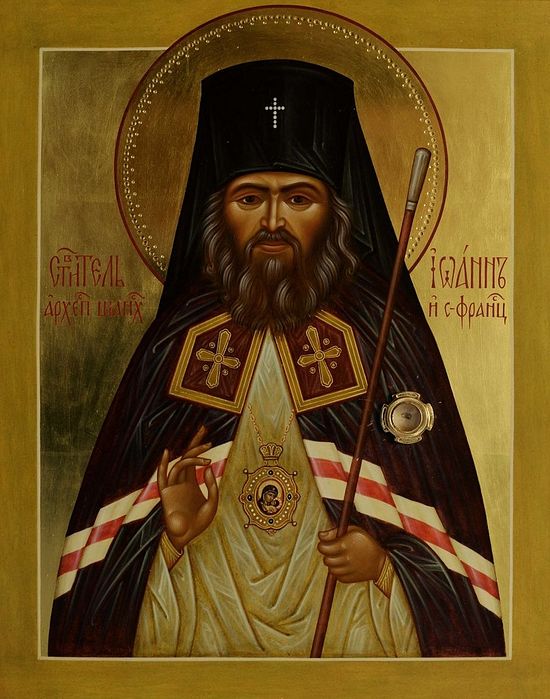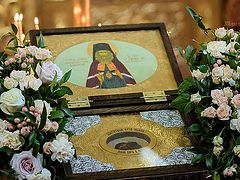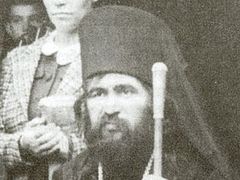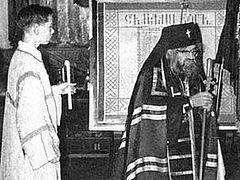This text has been transcribed from a cassette tape of an informal talk given by Fr. Seraphim at the St. Herman of Alaska Monastery, Platina, California, on the Sunday of the Holy Fathers of the Seven Ecumenical Councils in July, 1976, in honor of the tenth anniversary of Archbishop John's repose. Fr. Seraphim later included some ideas from this talk in his article "The Orthodox Theology of Archbishop John Maximovitch, " which was published for the first time in the St. Herman Calendar for 1976, and then as the introduction to The Orthodox Veneration of the Mother of God by Archbishop John (since reprinted under the title The Orthodox Veneration of Mary the Birthgiver of God by St. John Maximovitch).
1. "Theology on high"
Today we celebrated the feast of the Fathers of the Ecumenical Councils, which occurs at this time every year after the 16th of July. According to the service to them, these Fathers of the Ecumenical Councils are the seven pillars of wisdom upon which Christ our God has established the Church. It is very important for us on such a day to think about what theology is. First of all we must be fully aware that theology is not just a matter of some people who go to school, become very wise in reading the Scriptures and writings of the Holy Fathers, and then—either by themselves or coming together with others—very nicely, logically think out what they think the Church believes. That is all from the level of human understanding. Theology is something higher.
A very renowned theologian of our Church today—of the older generation which is now passing away, and whose message we have to get if we are to remain Orthodox—is Fr. Michael Pomazansky in Jordanville. Being aware of all the difficulties coming upon Orthodoxy now, of those people who are actually falling into wrong teachings, and of all these temptations which are in front of us, he said, "We have security in one thing that is, the Divine Services." This is because the whole of our theology is contained in the Divine Services, which were put together by such great Fathers as St. John Damascene and many others, already at this very time of the Ecumenical Councils, when the whole dogmatic teaching of the Church was established quite firmly. Thus, Fr. Michael writes to us that the Divine Services are a security for us in case people begin to get the wrong teaching. Also in the same letter, he notes in particular the Kontakion to these very Fathers. This Kontakion, which is repeated at other times of the year when the Holy Fathers are celebrated, is as follows:
The preaching of the Apostles and the doctrines of the Fathers sealed the One Faith of the Church; and wearing the garment of Truth woven from the theology on high, she (the Church) rightly divides and glorifies the great mystery of Godliness (piety).
We see here that theology is something like a garment woven from on high: "A garment of Truth woven from the theology on high." This is obviously an idea of theology quite remote from those simple courses in what is called theology. Theology—the knowledge of God, the science of God—is something which comes from on high by Divine inspiration. When the Holy Fathers come together in the Councils and the Holy Spirit is with them, those things which they decry, define and decree are not simply expressions of human wisdom, but are something which comes from above.
2. The theology of Archbship John
We have in our times, very close to us, someone who is a theologian precisely in this way: Archbishop John Maximovitch, who by God's grace was given to us in these latter times. In him we find many, many things which help us to remain true Orthodox Christians even in the very difficult times ahead. We see in him a very holy man, an ascetic with a rule of prayer and of helping others, and of not even resting. This is extremely high and inspiring; even though we ourselves do not do that, still we see in this a very inspiring example of how a Holy Father lives in our times. We continue to find many new treasures in him, aspects which have not been discussed too much before. And now we have come to the tenth anniversary of his death, which we celebrated less than a month ago. It also happens that this is the fiftieth anniversary of his priesthood and his becoming a monk. So it is very appropriate that we should now find another treasure in him: the treasury of his theological writings, which up to now have been very little known even in Russian. We have managed to gather together some of his writings, in fact quite a few; and we see that, indeed, although he is not openly glorified for being a great theologian, he is in fact a much greater theologian than many people who are glorified as being theologians. But he is a theologian precisely in the sense of the theology from on high, and not just of school lessons or academics, as we call them. From this we can find out something very important about how to be and remain conscious, true Orthodox Christians, and how to hand down the riches of our Orthodox Tradition, which is threatening to evaporate from the face of the earth.
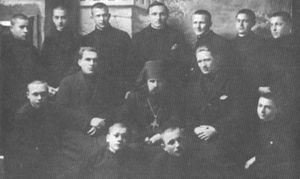 Hieromonk John (center) with Carpatho-Russian students at the Bitol Seminary, 1931. As for his theological background, Archbishop John, when he was in Serbia after he finished law school, went to the regular theological academy and got what we would call a doctor's degree in theology; that is, he went through all the courses, and therefore he knows all about theological questions, problems and so forth. In back of this, however, there is something even more important for a true theologian—and by a true theologian we mean someone who truly speaks the words of God and does not just repeat what he sees in books. Namely, he was from a very pious family; he was himself extremely devout in his childhood; he had experience of Holy Russia before the Revolution; he went to monasteries; he venerated the miracle-working icons; he had veneration for the saints and holy men; he read Lives of Saints; and he absorbed the whole atmosphere in Russia, which was then still possible for devout people. That is why later on he became such a great theologian and such a holy man.
Hieromonk John (center) with Carpatho-Russian students at the Bitol Seminary, 1931. As for his theological background, Archbishop John, when he was in Serbia after he finished law school, went to the regular theological academy and got what we would call a doctor's degree in theology; that is, he went through all the courses, and therefore he knows all about theological questions, problems and so forth. In back of this, however, there is something even more important for a true theologian—and by a true theologian we mean someone who truly speaks the words of God and does not just repeat what he sees in books. Namely, he was from a very pious family; he was himself extremely devout in his childhood; he had experience of Holy Russia before the Revolution; he went to monasteries; he venerated the miracle-working icons; he had veneration for the saints and holy men; he read Lives of Saints; and he absorbed the whole atmosphere in Russia, which was then still possible for devout people. That is why later on he became such a great theologian and such a holy man.
Besides this, we see one person who very much inspired him, although not in the sense that we would nowadays say "influenced" him (that is, we cannot say that this person influenced this or that, but rather that he inspired Archbishop John to be entirely in the Church and to be a theologian). This person was Metropolitan Anthony Khrapovitsky. He was the first head of the Russian Church Abroad, a great hierarch in the last days of the old Russia, and a very important historical figure in our days, both then and now. He was noted for his outspokenness, for being very bold, and for not being too polite when it came to important things in the Church. He was a very conscious fighter for all the best Orthodox traditions. He emphasized constantly the need to go "back to the Holy Fathers," which of course Archbishop John absorbed very thoroughly; and he also talked about Orthodox theology as being very closely bound up with spiritual and moral life, as opposed to simply being learned in school and then repeated.
The writings of Metropolitan Anthony, however, are quite different from those of Archbishop John, because Metropolitan Anthony was very much involved with the academic world. He was the head of several theological academies, and he had to be constantly aware of the problems of his time. He had to know what people like the Tolstoyites were thinking—people who were trying to undermine faith in God and the Church—and he was constantly thinking about how to get across the message of Orthodoxy to such people. He was constantly writing arguments back and forth about Orthodox theology, being himself very much bound up with the problems of presenting Orthodoxy to people who were far away from it. Thus, we find that his writings are actually much less inspiring then those of Archbishop John, which we will talk about now.
3. Balanced between extremes
The theological works of Archbishop John are quite a few in number. We have not yet found them all because they are not collected together in any one place. They are contained in old magazines, usually church magazines which had a very small circulation and have now been almost all lost. Some are from the old church magazines of the 1920's and '30's in Yugoslavia; others are from his own little periodicals in China and America. We found one long article just totally by chance—of course, it was by God's grace that we found it--which was printed in Warsaw in 1930, and of which there are probably very few copies left. Many of his writings are very small articles—sermons which are very deep—but he has several longer articles—20, 30, 40 pages—which are very important. He wrote against the heresy of Bulgakov and Sophiology. He wrote about the Mother of God in a treatise which we are translating for a new Orthodox Word. He also wrote about Holy Russia, the New Martyrs, the Church as the Body of Christ, the meaning of the Russian Diaspora (that is, the Russians in exile), the Orthodox monarchy, and several other such topics.
From his theological writings, we see in Archbishop John someone quite different from Metropolitan Anthony. The chief characteristic we can point out in his theological writings is freedom. He is entirely immersed in the Orthodox Tradition, and he is himself a source of true Orthodox theology. He has no kind of foreign influences or any overemphasis on one part of Tradition because of some controversy. This makes him especially valuable as an authority on something which is very much discussed today in the English language: the so-called Western influence on Orthodox theology in the last seven hundred years. In an article he wrote on iconography, for example, he emphasizes the true Orthodox iconographic style, but at the same time he is not too upset about Western-style icons as long as they are within certain limits and have been blessed to be in the Church.
He wrote also about one question: "For What Did Christ Pray in the Garden of Gethsemane?" Here we see how he was very expert in handling a subject that at that time was quite controversial. It had become controversial because his teacher Metropolitan Anthony had, in opposing what he called the scholastic interpretation of the "payment made to an angry God," gone himself a little too far in the opposite direction, and therefore had placed an overemphasis on the meaning of the prayer of Jesus Christ in the Garden of Gethsemane, as though this were the most important part of our redemption; and the Cross was somehow underemphasized. This often happens when one is involved in polemics, that is, with arguments with other theologians. Some go overboard on one side a little bit too much, and in counteracting that sometimes one goes a little too far on the other side. Archbishop John, however, had a very nice balance in this, which shows how sound his outlook was and how he did not go to any kind of extremes. He took the best part of Metropolitan Anthony's teaching on this subject—about the compassionate love of Jesus Christ for all mankind—and at the same time he corrected some of the mistakes which Metropolitan Anthony had put into his article. For example, Metropolitan Anthony said that it was unworthy of us to think that Jesus Christ should be afraid of His coming sufferings, whereas as a matter of fact most of the Holy Fathers talk about precisely this point: that this proves the human nature of Jesus Christ, that He was afraid of the coming sufferings. So Archbishop John corrected this and also gave the best part of Metropolitan Anthony's teaching on compassionate love. People were talking back and forth, some defending one point of view, some defending the other—and Archbishop John discussed it without making any controversy out of it at all. In fact, from reading his article you could never guess that there was any kind of controversy. This shows how very well balanced he was.
4. "Western influence"
Likewise there was this question of "Western influence," which Metropolitan Anthony also talked about a great deal. It is very important for us to understand exactly what this means, because it is true that, for several hundred years in the Orthodox Church, there were borrowings from the West, from Roman Catholics, in theological writings. Some people talk a little too much about Western influence; they go overboard and want to throw out everything from the last seven hundred years. Of course this is wrong. But in Archbishop John we notice that, just as he was very balanced towards Metropolitan Anthony when some people were protesting against his teaching, he was also very balanced with regard to the question of Western influence.
Once we ourselves asked Archbishop John about the question of Metropolitan Anthony's teaching, and he had a way of moving his hand and saying, "It's unimportant." That is, this teaching has very important parts and if there are mistakes in it, that's secondary, that's unimportant.
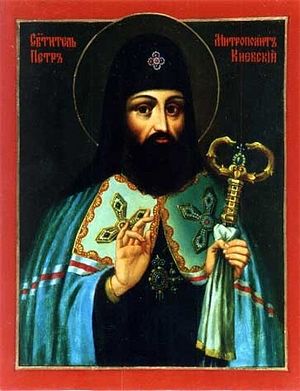 St. Peter Mogila Archbishop John had the same attitude with regard to someone else who is a great figure in Orthodox theology: Metropolitan Peter Mogila, who lived in the 17th century, the same time as St. Job of Pochaev, in the west of Russia. Metropolitan Peter has been accused of being under great Western influence; and some people even want to throw him out completely, saying that he is not Orthodox. Archbishop John, however, had very great reverence towards him; and we can see in this attitude something very important about the whole question of Western influence.
St. Peter Mogila Archbishop John had the same attitude with regard to someone else who is a great figure in Orthodox theology: Metropolitan Peter Mogila, who lived in the 17th century, the same time as St. Job of Pochaev, in the west of Russia. Metropolitan Peter has been accused of being under great Western influence; and some people even want to throw him out completely, saying that he is not Orthodox. Archbishop John, however, had very great reverence towards him; and we can see in this attitude something very important about the whole question of Western influence.
The question of Western influence entered into the Church after the Council of Florence in 1439. That was the time when, for political reasons, the Byzantine theologians went to the West and they capitulated; that is, they gave in to the teaching of the Roman Catholics and accepted certain things which were not Orthodox. They all signed the Union with Rome—all except for the great champion of Orthodoxy, St. Mark of Ephesus. After this there was a very difficult time in the Church.
We are now studying these events from five hundred years later. We can see that of course this false union was rejected, and that the Orthodox Church did not accept it. But at that time, and for quite a while afterwards—over a hundred years—the question of the Union of Florence was a very difficult one in the Church. In Russia, as soon as Metropolitan Isidore came back and said, "I signed the Union," they kicked him out. He came to church and the Tsar himself was there. "You did what?!" the Tsar said. "You signed the Union with Rome?"—and they put him in prison and refused the Union absolutely. He had to go back to the West, escaping through Poland, and finally he became a cardinal in the Roman Catholic Church, an apostate from Orthodoxy.
St. Mark of Ephesus, on the other hand, rejected the Union, first in the West and then in Greece; and when he came back he gathered around him people who were also against the Union. Then, only fifteen years after the Council of Florence, by God's judgment—very likely for the very reason that the Union had been accepted—Constantinople fell. After that there was a Patriarch Gennadius, a disciple of St. Mark of Ephesus, who rejected the Union; but there was still a great deal of confusion in the Greek Church for some time. There is a whole book on the subject by Timothy Ware (Fr. Kallistos), called Eustratios Argenti (Oxford, 1964), which discusses the attitude of the Greeks towards Rome in these very centuries after 1450. We see that there was a great deal of confusion in Greece as to whether the Catholics were part of the Church or not. Many times the Orthodox bishops would call in Franciscans and Jesuits to teach in their churches. Roman Catholics and Orthodox even had services in the same churches, although, in many places in Greece, they did have the altar in a separate place. Evidently they did not quite know whether or not they had accepted the Union. There were many who were fervently against it, but others said, "Well, we signed the papers; everybody signed, the Patriarch signed, the Emperor signed. Aren't we obliged?
"In Greece this problem was a lot worse than in Russia, but the same kind of thing happened in Russia also. In the western part of Russia the Latin missionaries came in and tried to seduce the people into becoming Roman Catholics. This was where the problem of the Western influence started in Russia.
This had already been going on for a hundred years or more, when, at the end of the 16th century, the Latins made another union, this time in the western part of Russia: the Brest-Litovsk Union, which St. Job of Pochaev was fighting against. Clearly, they were proceeding to take over the whole East. They were using the confusion of the people in Greece as to whether they were in union or not—they were using this as a chance to install their own missionaries, to settle their own bishops in the Greek cities, and then to actually take over the whole East, beginning with Greece and going to Russia.
This was a very critical time for Orthodoxy. The great Fathers knew that the Catholics had gone off in their doctrine and had fallen away from the Church, and yet there was this propaganda to be part of the Latin Church, as though the Pope were still the chief among the bishops. At the same time in the West there was occurring what we today call the "Renaissance": a whole movement of learning which of course to a large extent was a revival of ancient pagan ideas. The whole meaning of Renaissance can probably be summed up as a continuation of the Scholastic movement earlier in the West. That is, it was characterized by an increase of worldly wisdom, of something which is not necessary for the salvation of the soul. This was when science—learning about nature—began to have the importance it has today, when language was first studied, when translations were made, and when ancient Greek and Latin classics were revived from oblivion, having been very little studied in the earlier centuries after the fall of Greece and Rome. The level of learning increased: people became more aware of world history, of science, and of worldly wisdom in general.
In itself this worldly wisdom is of no importance; but once one enters into it, one acquires a certain attitude of mind. This attitude is not in itself hostile to salvation, but one has to understand it properly in order to find out how one can save one's soul if one has it. As a matter of fact, in the 20th century this movement of Western learning has now invaded the entire world. Everyone who comes to Orthodoxy today, with the possible exception of some tribes of Africans in Uganda and Kenya and so forth, is involved with this very question of knowing how to save your soul once you have become worldly-wise and sophisticated, knowing about world history, science, etc.
5. Giving answer for our faith
In both Russia and Greece in the 17th century, Orthodox education was on a very simple level. At that time there were people like Metropolitan Peter Mogila who saw that, in this so-called wisdom—this knowledge, this "college level education"—coming from the West, there was a very great danger for Orthodoxy' because the ordinary Orthodox people were very simple.
St. Peter the Apostle tells us in his Epistle that we must be ready to have an answer for those who ask us about the Faith. It so happens, however, that the simple person who believes Orthodoxy the way it has been handed down to him is not very able to have an answer when he has a very sly and sophisticated person coming to him and asking him all kinds of questions about the Faith—and not necessarily with bad intentions, either.
We even had an example in our little talk yesterday. We read in the Lives of Saints that a dragon came and began tempting the Saint, like St. Marina and St. John the Much-Suffering. What are we to think of this? You read this text to people who live here in Platina or San Francisco or anywhere in the modern world, who are not totally raised in the spirit of Orthodox piety, and they will tend to laugh at you. You try to give an explanation: "Well, there really were dragons," and they say, "Oh, don't fool us, you're making up things. This is superstition. You mean you really still believe that?" What do you answer them? Or if any of your children read at home the life of a saint and then go to school and talk about it, the people there will laugh them to death. "You mean you read these silly stories?" they will say. "Dragons occurring with big smoke?" In the Lives of Saints, the hair of St. Marina and the beard of St. John the Much-Suffering are actually singed by the dragon with fire coming out of his mouth. How are you to understand that? St. Marina was in prison; how did the dragon get by the guard, how did he get through the locked door? What's going on? Is there such a thing as a dragon in the first place? If you are very simple in your faith, you will say, Well, I believe it because that's what the Holy Fathers handed down to me." And they will say, "Oh yes, but you have to gather the writings of the Holy Fathers and correct them and throw out things like that." And in fact, if you look at the Roman Catholic Church today, you see that they do exactly that. They think that St. Nicholas or St. George do not even exist; they throw them out because they say this is superstition.
Therefore, with the coming of Western learning, there is a danger that Orthodoxy will be so simple and primitive that it will not know how to answer for itself. It will thus be only a small island of people who simply say, "I believe because that's the way it has been handed down"; and people who have had a Western education will not be able to believe. We see, then, that there is a need to understand what this question of Western learning is all about, so that we can answer them on their own arguments and tell them exactly what is going on.
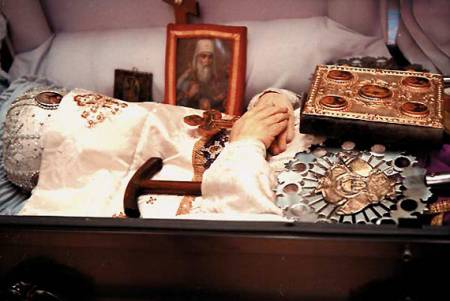 The incorrupt relics of St. John Maximovitch
The incorrupt relics of St. John Maximovitch
As a matter of fact, we do have arguments. There are those who have read the Lives of the Saints and believe them because the Holy Fathers have handed them down, and who at the same time have gone through college and understand what goes on in the Western mind. Actually, as we have said, everyone who is Orthodox today has a Western mind. It is obvious that there is no one left, except maybe a few simple villagers somewhere, who have a simple mentality. Most Orthodox people today—whether in Greece, in the Soviet Union, in all those countries behind the Iron Curtain, or in the Near East—have now been infected by this Western learning, and therefore we must have an answer on this level.
This is precisely what happened in Russia. There were very far-sighted people like Metropolitan Peter Mogila who saw that we cannot answer them unless we first learn what they know. When he became Metropolitan of Kiev, he saw that in Kiev there were very simple schools—Slavonic Greek schools—which were teaching simply the Tradition as it had been handed down, without being able to answer the questions of people who were learned in the Western sciences. Therefore he said that we must have a Latin school. People suddenly became horrified and said, "This is foreign, this is outside of our Tradition." And his answer was: "No, we must learn what they know so we can answer them." Thus he deliberately installed a Latin school, and for a century or more theological learning in Russia was largely in the Latin language, with all the books in Latin. Of course there are dangers here. You have to be able to distinguish what is real Orthodoxy and where the Latins have stuck in their own teaching. At that time it was not quite as bad as it is today, because today the Latins have gone completely off, whereas then they still preserved quite a bit of what was before the Schism. Therefore a person who has prudence and discernment can read these texts and find out where they are right or they are wrong and use them properly.
There were some cases in which Metropolitan Peter used phrases which came straight from the Latins and were not in the earlier Fathers. In cases like this, however, one does not have to become too upset. It so happens that the Orthodox Tradition is the Tradition of Truth, and therefore this Tradition itself corrects error whenever a statement becomes a little too much, a little off the mark. The Catechism of Metropolitan Peter Mogila, for example, was later corrected by a Greek theologian. After that it was corrected even more in Russia by Metropolitan Platon, and finally by Metropolitan Philaret of Moscow, the great hierarch who was actually the leading one who abolished the teaching of theology in Latin. Metropolitan Philaret lived at the beginning of the 19th century, already two centuries later. By that time, Western learning had already been assimilated, and thus it was no longer necessary to have everything in Latin. The Russians had their own Russian books, the level of education had risen very much, and people who were going to the Orthodox seminaries and theological academies knew just as must about all this Western learning as did people in the West. Therefore the time had come when Orthodox Christians in Russia could stop learning things in Latin and begin to learn them in Russian.
This, then, was the great function of Metropolitan Philaret of Moscow: to say, "The time has passed for us to depend so much upon Western learning in Western language. Let us now have it all in our language, and make sure we purify it of anything that is not quite right." In this process, certain words—which in themselves were not particularly bad but which were not precise according to the Patristic vocabulary—were thrown out.
Today, we have a situation in which Orthodoxy, having gone through this Western learning, is able to answer people from the West on their own grounds. That is, we are just as sophisticated as they are; we are just as aware of modern science and modern learning; and we will not be in the position of the simple villager who simply does not know what to say when someone starts criticizing dragons.
On the contrary, now a person who reads stories about dragons will be very good about finding out the Patristic teaching on this: how it is that a devil who is immaterial can singe a beard. We know that, according to St. Macarius the Great and other Fathers, the devil is not entirely immaterial. Only God is immaterial; and the devils and angels have actual bodies, although they are much more refined than our bodies. That, of course, was the case with those dragons which tortured St. Marina and St. John the Much-Suffering. They were not beasts, but were demons who took forms in order to frighten ascetics. We know this for various reasons, especially because when the Saint made the sign of the Cross or prayed, the dragon disappeared. It is obvious that this was an apparition of the demons.
There are other cases, such as the dragon of St. George, in which it looks like a real dragon was involved, some kind of real beast. Such beasts have existed; in fact there are records of them. Even recently—thirty years ago in Monterey—one was dragged up on the beach: a very unusual beast resembling what we would call a "sea monster." This, then, is a different matter, when there are actual beasts which do not disappear when you make the sign of the Cross and when you actually drag their bodies through the streets as St. George did.
Of course, there are many other respects in which we must know how to interpret what has been handed down by the Holy Fathers. By knowing what is thought by sophisticated people in the West, we can do this. This was the actual position of Metropolitan Peter Mogila, who, in spite of some expressions which later on were corrected and not accepted, is on the whole a very great Father. He handed Orthodoxy down to us, and helped Orthodoxy to defend itself against heretics who were trying to take away our Orthodoxy from us and place it entirely under the influence of the Latin West and worldly wisdom. It is owing to someone like Metropolitan Peter Mogila that we are today able to fight against these Westerners on their own grounds.
6. Foreign sources for the salvation of souls
Likewise, we see this question of so-called Western influence in a number of books which were adapted by Eastern Fathers, Greek and Russian, from Western sources. For example, already 150 years after Peter Mogila, we have in Greece the great Father, St. Nikodemos of the Holy Mountain, who took several books straight from the West, especially one called Unseen Warfare. Some people still criticize this and say, "Why do you have to take books from the West when we have our own books from the East?" We have to understand, then, the meaning of this. It is a little bit different from the question of Peter Mogila, because St. Nikodemos was taking something directly for spiritual purposes. The reason for this was that St. Nikodemos was mostly concerned with how to present the Orthodox Tradition and Orthodox spirituality to people who had already gone away from the ancient tradition of piety. They were already losing the savor of Orthodoxy. To a person who is not very aware of Orthodox spiritual language or spiritual life, you cannot simply give The Ladder of St. John. We know people who pick it up, read it and say, "Oh, that's for monks. That's too advanced. I can't understand that." Therefore, there must be for them something more on their level, more "ABC." They have already been corrupted by Western learning, and so you have to give them something a little more primitive. Thus, St. Nikodemos took from the West precisely such a book as Unseen Warfare, which on the whole is not a bad book, and he corrected it further, throwing out anything that was Latin and introducing things which were Orthodox. Later on, Bishop Theophan the Recluse in Russia did even more to present this book as an excellent book of spiritual guidance, especially on the more primitive level. This kind of book did not appear in ancient times because the people of ancient times were not corrupted like we are today. A book like Unseen Warfare is a book for us today who are corrupted. We have to get back to our sources, and this book helps us precisely to get back to them. This, then, helps to give a more balanced picture to the whole question of Western influences.
A similar case occurred when St. Macarius of Corinth, a friend of St. Nikodemos, wrote a book on frequent Communion. At that time, both in Greece and in Russia, the custom had been introduced through carelessness in spiritual life of receiving Communion very infrequently, that is, once a year or some other such minimum. Of course, this was not very good; it was a minimum of spiritual life. We know that all our Holy Fathers at all times have encouraged the reception of Holy Communion more frequently than that. This does not necessarily mean all the time or every day, but more frequently than once a year. In fact, although it depends upon each spiritual father how often one is blessed to receive Holy Communion, it is certainly true that any Driest nowadays who is concerned about encouraging spiritual life will encourage people to receive Communion on all the Great Feasts and several times during the fasts, that is, quite frequently.
It so happened that this whole idea of frequent Communion arose in the West. In 1640 or so, a man in France named Ardenon wrote a book called On Frequent communion, which sets forth the writings of Holy Fathers on the subject. On the whole it is not a bad book. Perhaps there are some things in it which are purely Catholic spirituality, but there are quite a few chapters which are purely quotes from Holy Fathers about receiving Holy Communion.
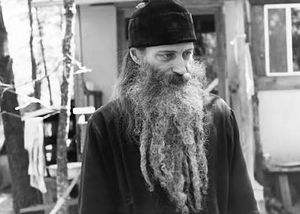 Hieromonk Seraphim (Rose), a loyal spiritual child of St. John At about the same time in Spain, someone named Miguel De Molinos also wrote about frequent Communion. It is very likely, although we cannot prove it right now, that St. Macarius read one or both of these books, and that he even translated whole chapters from them for his own book. We do not need to get upset that he may have been taking a Western spiritual practice, however, if we realize that St. Macarius was adapting from the West something which can be important for us in our corrupted state; therefore there is nothing wrong with it at all. In fact, this is what we may call a true theological wisdom: when one is not afraid of something foreign just because it is foreign. One can take something foreign, having a higher wisdom which the Church gives, and adapt for one's own what is useful and throw out what is not useful.
Hieromonk Seraphim (Rose), a loyal spiritual child of St. John At about the same time in Spain, someone named Miguel De Molinos also wrote about frequent Communion. It is very likely, although we cannot prove it right now, that St. Macarius read one or both of these books, and that he even translated whole chapters from them for his own book. We do not need to get upset that he may have been taking a Western spiritual practice, however, if we realize that St. Macarius was adapting from the West something which can be important for us in our corrupted state; therefore there is nothing wrong with it at all. In fact, this is what we may call a true theological wisdom: when one is not afraid of something foreign just because it is foreign. One can take something foreign, having a higher wisdom which the Church gives, and adapt for one's own what is useful and throw out what is not useful.
This kind of theological wisdom is precisely what we find in Archbishop John. Archbishop John did not have any great prejudice against Western sources. He was in the full Tradition of Orthodoxy, and in the full Tradition of those who adapted from wherever they could find sources for spiritual profit. Therefore, he equally venerated Metropolitan Peter Mogila and Metropolitan Anthony Khrapovitsky. If these two hierarchs seem to contradict each other on some points, higher theological wisdom can find out where they are actually in a deeper agreement; and one does not need to be upset by these lesser differences, about whether one is pro-West or anti-West. In the end, one becomes in some respects pro-West. Archbishop John, in fact, in his article on iconography says that, during those centuries when the Western influence was coming to the East, there were many respects in which it was bad, but many respects in which it was a good thing. This, of course, comes from the idea of learning in order to know what is going on in the West, in order to combat Western ideas on their own level, and even of adapting some spiritual books for the use of Orthodoxy. Let us remember once more that we today are in a situation where everyone who is Orthodox is totally immersed in this Western world, this Western understanding; and therefore we had better know how to take wisdom from it, what to accept and what to reject.
The gesture that Archbishop John made with his hands—as if to say "it's unimportant"—may be applied, for example, to Metropolitan Peter Mogila's use of the word "transubstantiation." It so happens that this word is bound up with Thomas Aquinas' theology about substance and accidents and so forth. We do not accept that teaching, it is too philosophical for us; and therefore we do not need to use that word. You can use the word without having to accept the whole philosophy of Thomas Aquinas; but it is better to use other words, maybe words such as transformation or transelementation, etc. Nevertheless, we do not have to get upset over the use of that word: we can use whatever promotes piety in these Western sources, and not get upset about it.
7. Above the level of fighting
The important thing we learn from the writings of Archbishop John is: stand above the level of fighting in theology. If you take up any writing of Archbishop John, whether a sermon or a long article, you see that there is absolutely no controversy. Even when he is "fighting" someone like Bulgakov, and has to show where he is quoting the Fathers wrongly and where his teaching is not Orthodox—even there you do not get the impression that he is fighting, like our academic theologians. On the contrary, he is very calm. There is a certain teaching of the Fathers—he presents it; and where Bulgakov goes off, he shows it: "This is not right, here he quoted wrong."
Bulgakov was noted as being the most Patristic of all these actual heretics of the Paris school, as one who was constantly quoting the Fathers. Most people do not know the Fathers too well, and therefore they are very impressed when, for example, Bulgakov quotes a doctrine on the Mother of God. Bulgakov does not quite say what the Latins say—that there is an immaculate conception—but he says that the Mother of God is without sin. According to Orthodox Tradition, we do not say the Mother of God is without sin. We say that she did not fall into sin, but that she had original sin, ancestral sin, and also that she had sinfulness in her mind. There is no doubt she was subject to the same sins in general that all flesh is subject to, except for our Lord Jesus Christ; but she did not fall into sin. Bulgakov, however, did not understand such a distinction when he talked about the sinlessness of the Mother of God; and he quoted fifty texts from the Divine Services and from the writings of Holy Fathers about this question of the sinlessness of the Mother of God.
Archbishop John, being a very competent theologian, examined all these fifty texts, and he showed that not a single one of them says what Bulgakov claims it says. Either Bulgakov was taking a text out of context and the rest of the passage from the Holy Father says exactly the opposite, or else he was making it say more than it was supposed to say. In general, Bulgakov simply did not understand how to read the Holy Fathers, and he was trying to force them to say what he wanted them to say. Archbishop John had to show that in every case it was not true-that these Holy Fathers did not say what Bulgakov thought they were saying.
Here we see the great freedom of Archbishop John's theological works: how he was above petty fighting. Some people who go to academic schools are very fond of "proving" that someone else is way off and thus "triumphing." It's like undergraduate fighting. Archbishop John was above that, showing calmly and clearly what is the true teaching of the Church, and not getting excited over small points. This freedom of his theological spirit is very important for us.
There is an interesting story, which we heard from a priest in San Francisco, which shows how free Archbishop John was in his theological spirit, how he was above small details; how, even when it came to small details which in themselves were very good, still he was above them.
The story occurred one year in Shanghai, when the Russian school and catechism was finished for the year. In such Orthodox Russian schools, they had the custom of oral examinations. Instead of just writing down the answers to questions, the students had to stand up and give an oral reply, which showed the teacher how well they were able to express themselves, how polite they were, how proper, and so forth. Also, the examiner—who is usually the head of the school (in this case Archbishop John)—would see how well the teacher had been teaching the students. At this particular oral examination, one girl got up and was reciting the part about the Old Testament from the catechism. There was a part where it said, "Recite the major prophets and the minor prophets of the Old Testament." We know, of course, that for practical purposes in these modern catechisms the prophets are divided up into those who wrote lone books with important prophecies in them, and those who wrote very small books in which the prophecies are not quite so striking. It is an obvious distinction, and it is an aid to learning. You can memorize the names better if you learn that there are twelve minor prophets, and so forth. With God, though, this is obviously not so important. Thus, as the girl began reciting the names of the twelve Minor Prophets, quite properly just as she had memorized them, all of a sudden Archbishop John says, "There's no such thing as a minor prophet!" Of course the poor girl was excited and the teacher was insulted because he had taught them all about the Minor Prophets and the Major Prophets.
Why did Archbishop John say such a thing, why did he deny what everyone had been learning? It was because he was thinking first of all how it is with God. With God, of course there are no minor prophets. Anyone who is a prophet sees the future; he is obviously a divine person, a saint. It is true that there are some who prophesied less and some who prophesied more, but with God they are all great, they are all major.
This story shows that Vladyka John was above putting things into categories—although of course he accepted the fact that you learn who are minor and who are major. And it again shows his balance, his sobriety, and his freedom—and the fact that for him the teaching of the Church was first of all what we read in the Kontakion to the Holy Fathers: something "woven from the theology on high." It comes from God; there is a different flavor to it; it is not simply what you read in books. What you read in books helps you; it is good to learn it. But we must remember that above that is theology which comes from on high, from God.
This is what makes Archbishop John so inspiring for us today, and actually an example for us not to get involved with small points, with small controversies, but to remember that theology is something which comes from above, from God. He himself, being present every day at the Divine Services, used above all this source when giving theology. Probably more than any other theologian of modern times, he quotes the services of the Church, because for him theology was not a matter of just reading books and writing things out, but was first of all a matter of absorbing the teaching of the Church in the services. And that is why the attitude of controversy, of polemics, is absent in his works, even when he is proving what is right and what is wrong.
Originally published in The Orthodox Word, No. 175-176, 1994, pp. 142-158

